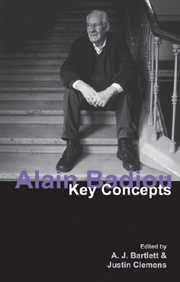Book contents
- Frontmatter
- Contents
- Contributors
- Acknowledgements
- Abbreviations
- Miscellaneous Frontmatter
- Introduction: Badiou's form
- 1 Biography and early works
- PART I THE FOUNDATIONS OF BADIOU'S THOUGHT
- 2 Philosophy
- 3 The conditions
- 4 The subject
- 5 Ontology
- PART II BADIOU'S KEY CONCEPTS OR “CONDITIONS”
- PART III BADIOU'S ENGAGEMENT WITH KEY PHILOSOPHERS
- Afterword: Badiou's futures
- Bibliography
- Index
2 - Philosophy
from PART I - THE FOUNDATIONS OF BADIOU'S THOUGHT
- Frontmatter
- Contents
- Contributors
- Acknowledgements
- Abbreviations
- Miscellaneous Frontmatter
- Introduction: Badiou's form
- 1 Biography and early works
- PART I THE FOUNDATIONS OF BADIOU'S THOUGHT
- 2 Philosophy
- 3 The conditions
- 4 The subject
- 5 Ontology
- PART II BADIOU'S KEY CONCEPTS OR “CONDITIONS”
- PART III BADIOU'S ENGAGEMENT WITH KEY PHILOSOPHERS
- Afterword: Badiou's futures
- Bibliography
- Index
Summary
Badiou is a fellow traveller – not of communism, being a Maoist, but of poststructuralism. He sympathized with its critique of philosophy's ubiquitous presupposition of unity and identity; he sympathized with its attempt to think multiplicity. One can detect thousands of tiny poststructuralist influences in every one of his texts. For this reason it was all the more surprising – especially for the anglophone practitioners of theory and the permanent blurring of disciplinary boundaries – when Badiou suddenly called for a return to philosophy, for an end to the end of philosophy and its endless deconstruction, when he called for a restart. We were not ready. It sounded reactionary.
To understand Badiou's call it is not enough to realize that many poststructuralists, such as Jean-Luc Nancy, never gave up on the name. The very concept and position of philosophy must be investigated in each period of Badiou's œuvre. It is only in the third and apparently final period of his work, opened in 1985 by the text Can Politics be Thought?, that a full doctrine on the nature of philosophy is developed and promulgated, the doctrine of conditions. This chapter will briefly examine the place of philosophy in Badiou's early work and then his Maoist period before investigating the nature of philosophy under its conditions.
Althusserian epistemology
It is possible to distinguish a short period of Althusserian epistemological enquiry before Badiou's Maoist commitment takes over in the 1970s.
- Type
- Chapter
- Information
- Alain BadiouKey Concepts, pp. 13 - 24Publisher: Acumen PublishingPrint publication year: 2010

